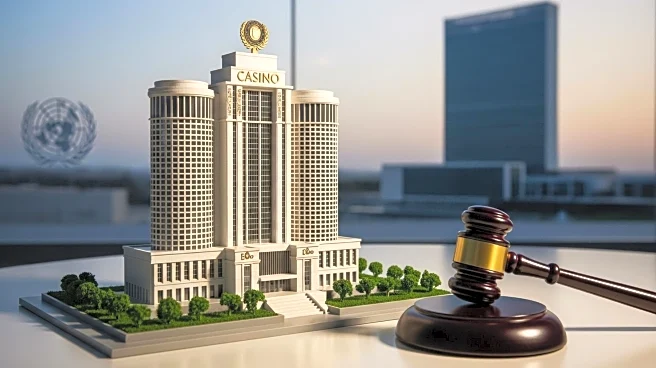What's Happening?
A community advisory panel has voted against the proposed Freedom Plaza casino near the United Nations headquarters in Manhattan. The decision marks the third casino proposal to be rejected in the borough, effectively halting any immediate plans for casino development in Manhattan. The proposal, which included nearly 1,100 units of affordable housing, was rejected by a 4-2 vote. Reshma Patel, a committee member appointed by Assembly member Harvey Epstein, expressed concerns over optimistic revenue projections and potential negative impacts such as increased traffic, crime, and gambling addiction. The rejection leaves five other casino projects vying for three downstate casino licenses, which are expected to be awarded by the end of the year.
Why It's Important?
The rejection of the Freedom Plaza casino proposal highlights ongoing community resistance to large-scale developments perceived to have adverse effects on local neighborhoods. The decision underscores the importance of community input in urban planning and development processes. The rejection also impacts economic stakeholders, as the proposed project promised thousands of jobs and significant investment in the area. The decision reflects broader concerns about balancing economic development with community welfare, and it may influence future proposals and negotiations for casino licenses in New York City.
What's Next?
With the rejection of the Freedom Plaza proposal, attention will shift to the remaining five casino projects competing for licenses. These include proposals in Queens, Brooklyn, the Bronx, and Westchester County. The state is expected to award up to three downstate casino licenses by the end of the year, and developers will likely continue to lobby for their projects. Community groups and local officials may also intensify their efforts to influence the decision-making process, advocating for developments that align with community interests and priorities.
Beyond the Headlines
The rejection of the casino proposal may have broader implications for urban development in Manhattan, setting a precedent for community-driven decision-making. It raises questions about the role of large-scale developments in urban areas and the potential social and economic impacts they bring. The decision may encourage other communities to organize and voice their concerns about similar projects, potentially leading to more sustainable and community-focused urban planning practices.








